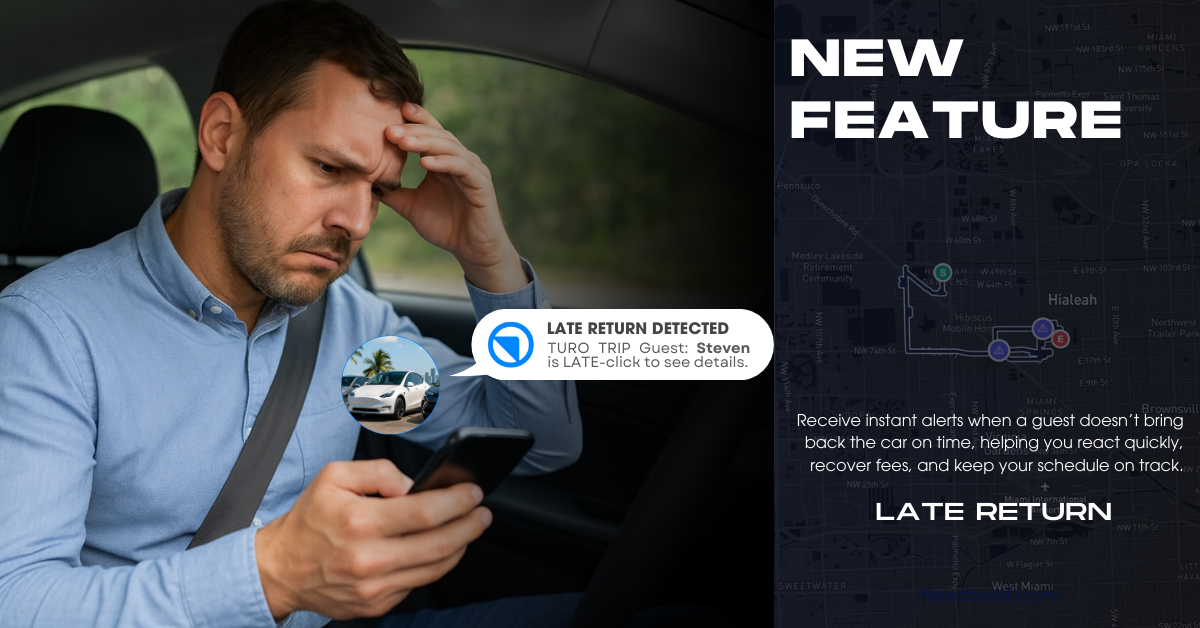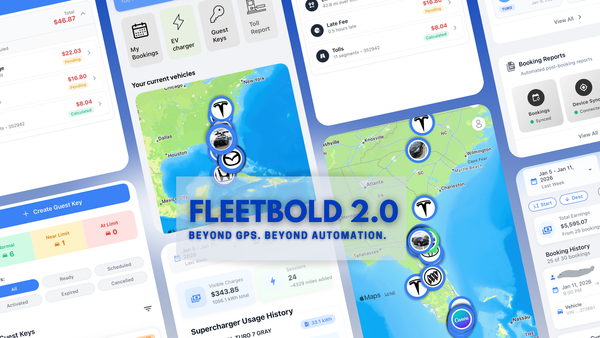The Hidden Costs of Late Returns in the Car Rental Business (And How FleetBold Changes the Game)
Late returns aren’t just about waiting a little longer. For Turo Hosts and car rental businesses, they create chain reactions that lead to lost income, canceled trips, and unhappy guests. FleetBold’s Late Return alerts transform this problem from an unpredictable headache into a manageable workflow.

The Reality of Late Returns in the Car Rental Business
If you’ve managed even a small fleet, you know the story all too well. Picture a busy weekend. A car is booked to return at 1 PM, and the next guest is due to pick it up at 3 PM. That two-hour buffer feels safe enough time to inspect, clean, and reset. But 1:15 passes, then 1:30, and there’s still no sign of the car. By 1:45 you finally hear from the guest. They casually assure you they’re “on the way,” but GPS tracking reveals they’re stuck in traffic nearly an hour away.
Now the two-hour buffer collapses into a problem. The car isn’t going to be ready at 3 PM. By the time the new renter shows up, you’re left explaining why their vehicle is unavailable, trying to negotiate alternatives, and risking cancellation. In most cases, the story ends with frustration, refunds, and a negative review.
For big rental companies, this scenario is annoying but manageable. They simply swap cars from a large inventory and send the next guest on their way without disruption. But for a Turo Host or small operator, there is no spare car waiting. The exact car booked is the one that must be delivered, and when it’s not there, the chain breaks.
This is why late returns are disproportionately damaging in peer-to-peer rentals. Hosts can’t hide behind inventory buffers. When one trip runs late, the next trip is at risk. And industry data shows that in nearly 87% of these cases, the outcome is a cancellation, leaving the host to absorb both financial and reputational damage.
The Direct and Hidden Costs of a Late Return
On the surface, a late return looks like a simple transaction issue. A guest brings the car back late, and the host charges a late fee. Problem solved, right? Not quite. The fee may recover a small portion of the inconvenience, but it doesn’t touch the real losses.
Direct Costs
The most obvious cost is lost revenue. If a car isn’t ready for the next trip, that trip often gets canceled, wiping out an entire booking’s worth of income. Cleaning schedules get disrupted, which means extra time and labor costs. Repairs or inspections that should have happened in between trips get rushed, increasing the chance of missed issues or accidents later.
Hidden Costs
But the bigger costs are hidden:
- Guest Satisfaction and Reviews
The next guest doesn’t care about your previous renter’s delays. All they see is a car that wasn’t ready on time. That frustration translates into negative reviews that lower your reliability score and make it harder to attract new customers. - Operational Stress
Instead of focusing on scaling your fleet or running your business, you spend valuable hours chasing down guests, answering angry messages, and trying to put out fires. - Brand Reputation
For Turo Hosts, every review matters. A reputation for being unreliable or poorly organized can cut future bookings dramatically. Unlike a big rental brand that has decades of name recognition, Turo Hosts rely entirely on their online reputation.
This combination of direct and hidden costs means late returns hit much harder than they appear. The financial impact is immediate, but the long-term damage to guest trust is even more costly.
Why Traditional Responses Fail
For years, hosts have relied on two basic tools to handle late returns: late fees and manual communication. Both are limited.
Late Fees Don’t Solve the Real Problem
Yes, you can charge a fee if a guest returns late. But does that recover the canceled trip that followed? No. Does it repair the damage to your reputation when the next guest leaves unhappy? No. A late fee is a band-aid on a much deeper wound.
Manual Messaging Creates Stress
Without automated systems, hosts spend hours texting or calling guests to confirm return times. This reactive process means problems are often discovered too late to fix. Instead of planning around delays, you are constantly reacting after the fact.
Lack of Documentation Hurts Disputes
Even when hosts try to enforce late fees or dispute cancellations, the lack of precise data often weakens their case. Without clear GPS tracking logs or system-generated alerts, it becomes your word against the guest’s a situation that rarely works in the host’s favor.
In short, traditional responses don’t scale. They may work for a single car, but for a growing fleet, they collapse under the weight of repeated problems.

-FleetBold study shows hosts lose an average of $312 per car monthly due to late returns the highest losses occur after 8PM drop-offs, when vehicles are often not checked until the next day. Missed security camera logs and GPS updates make it harder to prove return times, leaving hosts with lost revenue and disputes.-
FleetBold’s Dual Alert System: Reactive and Proactive
FleetBold was built to solve this exact issue, combining the power of GPS devices, Tesla API integration, and smart alerting systems into a workflow designed for hosts.
The first layer is the reactive Late Return alert. This triggers the instant a car is overdue, giving the host clear documentation of the late return. This alone is powerful: it provides proof for disputes, enables fee enforcement, and gives you immediate awareness of what’s happening.
But the real innovation is the proactive alerting system. FleetBold doesn’t wait until a guest is late. Using GPS data, it calculates whether the guest can realistically make the return time. If it’s clear they won’t, FleetBold warns the host in advance.
That early notification changes everything. Now you have hours, not minutes, to act. You can message the current guest and suggest extending their trip — turning lateness into extra income rather than a penalty. At the same time, you can prepare the next guest with a vehicle swap or an adjusted plan, avoiding frustration at the pickup site.
This proactive model is what large rental companies achieve with their big inventories. They can quietly swap cars without disrupting the customer. Turo Hosts normally don’t have that luxury but with FleetBold, they gain similar flexibility through technology.
Impact at the Fleet Level
One late return on one car is a headache. Multiple late returns across a fleet is chaos. For operators managing 10, 20, or even 50 cars, the problem multiplies fast. Each delay threatens schedules, each cancellation chips away at revenue, and the operational stress compounds.
FleetBold’s scalable architecture was designed for this reality. By providing both reactive and proactive alerts across the entire fleet, it reduces manual chasing, improves utilization, and protects guest satisfaction at scale. Instead of hosts being blindsided at pickup time, they are equipped with foresight and control.
This scalability matters. FleetBold isn’t just a tool for one or two vehicles. It was engineered to support both small Turo Hosts and large rental operations seamlessly. Whether you’re managing five cars or five hundred, the alerts adapt to the size of your business.
Why GPS Devices Matter in the Equation
A key part of this system is GPS tracking. FleetBold integrates with Tesla vehicles directly through the Tesla API, requiring no extra hardware. For other vehicles, the system works with OBD or hardwired GPS devices.
This flexibility matters because not every fleet is the same. A Turo Host with a mix of vehicles can connect everything EVs, ICE cars, Teslas, and traditional models into one platform. GPS devices feed real-time location, trip data, and usage patterns into FleetBold, powering the alert system.
By combining direct Tesla integration with multi-device GPS compatibility, FleetBold becomes a universal solution rather than a fragmented one.
The Bigger Picture: Car Rental Business vs Turo Hosting
It’s important to understand the difference in context. In the car rental business, a late return is usually absorbed by inventory. If one Toyota Camry comes back late, the company provides another from the lot. The guest never even notices.
For a Turo Host, there is no backup Camry. The booking is tied to that exact car, and if it isn’t ready, the entire trip is in jeopardy. This is why late returns carry so much more weight in peer-to-peer rentals.
FleetBold’s alert system bridges this gap. It gives individual hosts tools that mimic the flexibility of large rental companies, without requiring massive inventory. By using GPS data intelligently, it levels the playing field.
Conclusion
Late returns are one of the most underestimated threats in car rental operations. They aren’t just inconvenient; they are disruptive, costly, and reputation-damaging. For Turo Hosts, the impact is even greater, since a single car’s lateness can destroy the entire booking flow.
Traditional tools like late fees and manual messaging fail to address the core issue. They react too late and leave hosts without control. FleetBold changes the equation by combining reactive alerts with proactive intelligence, powered by GPS devices and Tesla integration.
This dual system transforms late returns from chaotic disruptions into manageable events. For hosts, it means fewer cancellations, better guest satisfaction, and stronger revenue. For fleets, it means scalable efficiency that grows with the business.
With FleetBold, late returns stop being the nightmare of hosting and become just another manageable part of running a modern fleet.
FAQ
What is considered a late return on Turo?
A trip is late if the guest doesn’t return the car by the scheduled end time. Hosts can charge fees, but the process often requires proof and clear communication.
Why are late returns so damaging for Turo Hosts?
Unlike big rental companies, Turo Hosts usually don’t have backup cars to offer. When a guest is late, the next trip often cancels, causing both financial and reputational loss.
How does FleetBold help with late returns?
FleetBold provides two layers of alerts: one when a car is already overdue, and another when it predicts the guest won’t make the return on time. This allows proactive action, like offering extensions or arranging vehicle swaps.
Do I need GPS devices to use FleetBold?
For Tesla vehicles, no. FleetBold connects directly via Tesla API. For other cars, yes OBD or hardwired GPS devices are used to provide real-time tracking and alert data.
Does FleetBold work only for Turo Hosts?
No. FleetBold is designed for all car rental businesses. Whether you’re running a traditional fleet or hosting on Turo, the platform scales to your needs.






